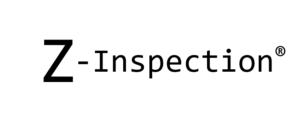Z-Inspection® teaching certification
Benefits:
A “Z-Inspection® Teaching Certificate” allows you to teach the Z-Inspection® process for non-commercial purposes.
Who qualifies?
i) Experts who were part of the core-team who developed the Z-Inspection® process
and/or
ii) Members of the Z-Inspection® Initiative who successfully complete at least one real life use case using the Z-Inspection® process
qualify to be awarded the certificate.
and
The teaching certificate is awarded after completing three training sessions, namely:
……………………………………………………………………………………………………………………………………………………………………………………………………………………….
Session 1. EU guidelines for Trustworthy AI.
Watch these two videos:
EU Ethics Guidelines for Trustworthy AI. Part I. https://youtu.be/ACKFKOccipE
EU Ethics Guidelines for Trustworthy AI. Part II. https://youtu.be/H1dvXImYtWY
Copy of the presentations:
Lesson slides: EUFramework.SNU.2023.
Reading:
– Ethics Guidelines for Trustworthy AI. Independent High-Level Expert Group on Artificial Intelligence. European commission, 8 April, 2019. Link to .PDF
……………………………………………………………………………………………………………………………………………………………………………………………………………………………..
Session 2. Z-Inspection®: A process to assess trustworthy AI
Watch this YouTube video
How to Assess Trustworthy AI in Practic. https://www.youtube.com/watch?v=uP02B3KsX9E
Lesson slides:
SNU-Z-Inspection.SocioTechnicalScenarios.2023
SNU-Z-Inspection.Claim Arguments and Evidence.2023
SNU-Z-Inspection.EthicalTensions.2023
Readings
Z-Inspection®: A Process to Assess Trustworthy AI. IEEE Transactions on Technology and Society, 2021. Digital Object Identifier: 10.1109/TTS.2021.3066209 DOWNLOAD THE PAPER,
How to Assess Trustworthy AI in Practice. arXiv:2206.09887 [cs.CY] [v1] Mon, 20 Jun 2022. https://arxiv.org/abs/2206.09887
………………………………………………………………………………..
Session 3. A 1.5 hour session via Zoom describing the teaching materials available (including time for questions)
…………………………………………………………………………………………………………………………………………………………………………………………………………………………………………
List of Certified Z-Inspection® Teaching Experts:
Magnus Westerlund, Arcada University of Applied Sciences, Helsinki, Finland and Z-Inspection® Initiative
Elisabeth Hildt, Center for the Study of Ethics in the Professions, Illinois Institute of Technology, Chicago, USA
and Z-Inspection® Initiative
Karsten Tolle, Goethe University Frankfurt, Germany and Z-Inspection® Initiative
Dennis Vetter, Goethe University Frankfurt, Germany and Z-Inspection® Initiative
Alessio Gallucci, Z-Inspection® Initiative
Emilie Wiinblad Mathez, Z-Inspection® Initiative
Hanna-Maria Sormunen, Z-Inspection® Initiative
Gemma Roig, Goethe University Frankfurt, Germany and Z-Inspection® Initiative
Jesmin Jahan Tithi, Z-Inspection® Initiative
Pedro Kringen, Z-Inspection® Initiative
Frédérick Bruneault, École des médias, Université du Québec à Montréal, Canada and Z-Inspection® Initiative
Megan Coffee, NYU Grossman School of Medicine, New York, USA and Z-Inspection® Initiative
Renee Wurth, Z-Inspection® Initiative
Irmhild van Halem, Z-Inspection® Initiative
Boris Düdder, University of Copenhagen (UCPH), Denmark and Z-Inspection® Initiative
Sune Holm, University of Copenhagen (UCPH), Denmark and Z-Inspection® Initiative
Vince I. Madai, QUEST Centre, Berlin Institute of Health (BIH) at Charite Berlin, Germany and Z-Inspection® Initiative
Pedro A. Moreno Sánchez, Faculty of Medicine and Health Technology, Tampere University (Finland) and Z-Inspection® Initiative
Heejin Kim, Graduate School of Data Science, Seoul National University (SNU), South Korea
Somaieh Nikpoor, Z-Inspection® Initiative.
Willy Tadema, Rijks ICT Gilde, The Netherlands
Marijke ter Steege, DUO (Dienst Uitvoering Onderwijs), The Netherlands
Gerard Kema, Innovator Manager, Province of Friesland, The Netherlands
Genien Pathuis, Innovator Manager, Province of Friesland, The Netherlands
Andréane Sabourin Laflamme, Cégep André-Laurendeau, Montreal, Canada
……………………………………………………………………………………………………………………………………………………………………………………………………………………………………….
Z-inspection® is a registered trademark.
This work is distributed under the terms and conditions of the Creative Commons (Attribution-NonCommercial-ShareAlike CC BY-NC-SA) license.
